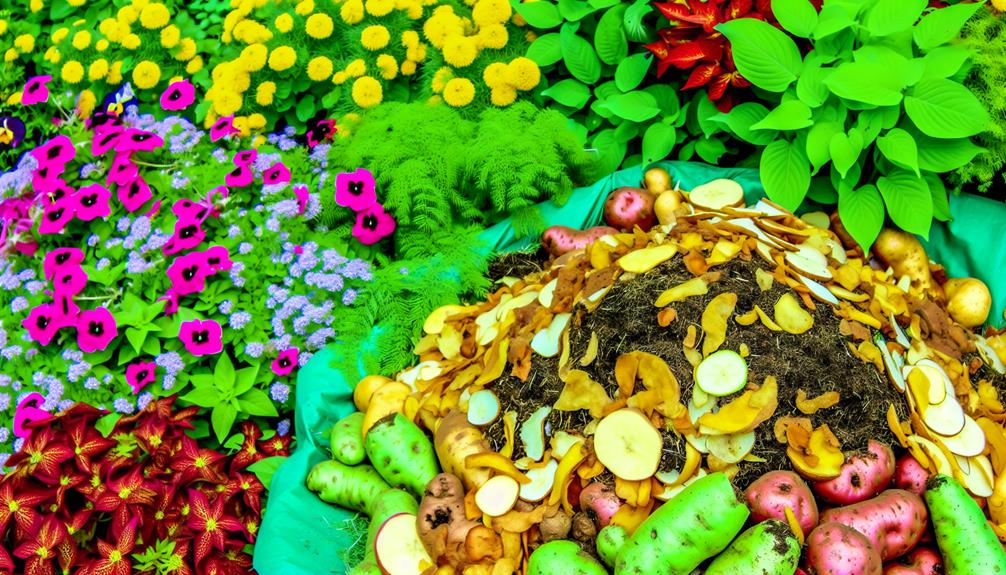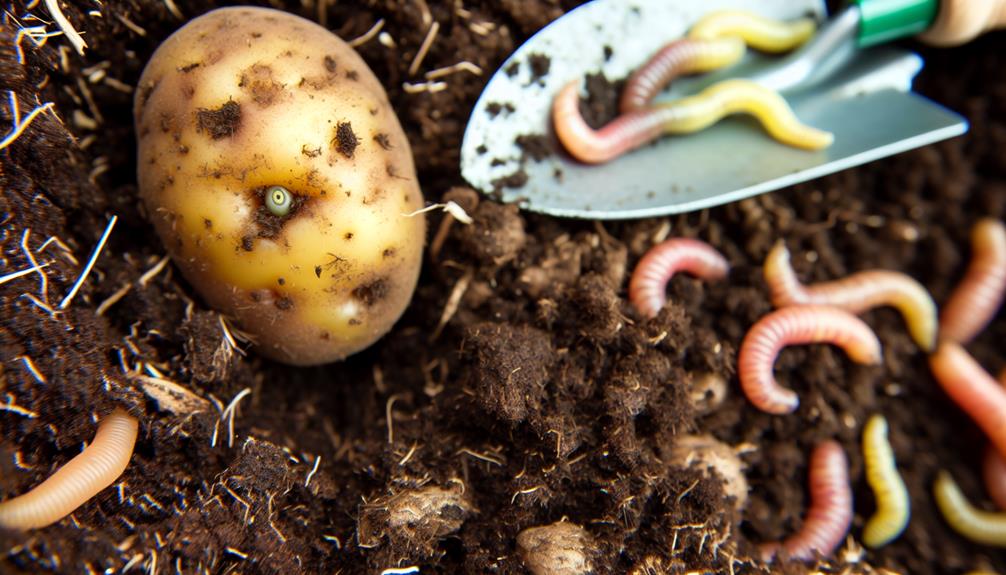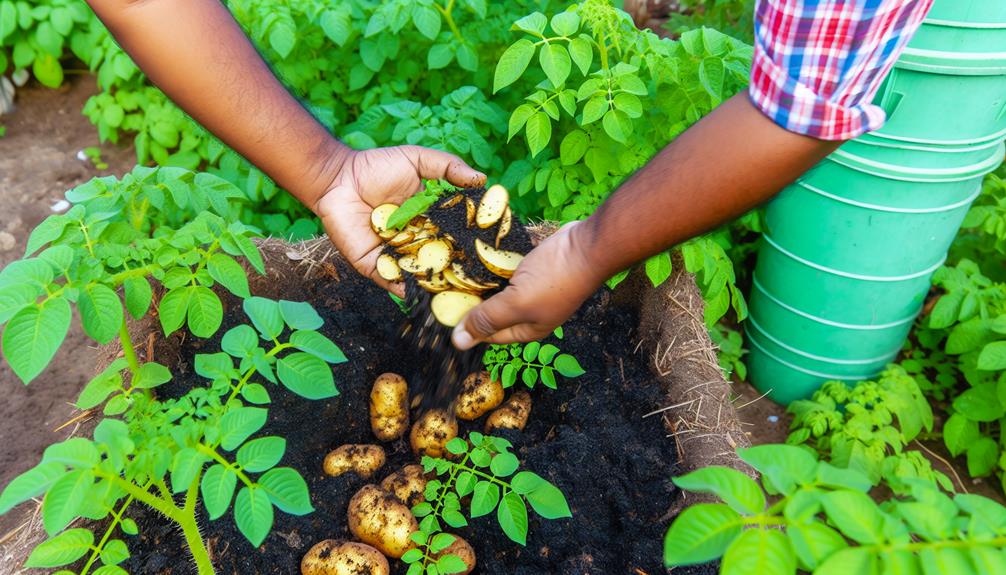

You can compost potatoes effectively by chopping them into smaller pieces, which accelerates decomposition and reduces pest attraction. Always remove sprouted eyes to avoid toxin buildup and prevent unwanted plants from growing in your compost. Cover potato scraps with brown materials like leaves to deter rodents, and guarantee the compost is well-aerated for efficient breakdown.
Regularly turning the pile helps maintain proper aeration and moisture balance. Potato peelings enrich the soil with vitamins and minerals, improving soil health and structure. Take a look at more tips to optimize your composting and maintain a healthy pile.
Potato peelings are a key addition to your compost pile because they decompose quickly and enrich the soil. When you toss those peelings into your compost, you’re leveraging their peeling benefits. They break down easily, speeding up the composting process and ensuring a faster turnover of organic matter. This way, you get rich, nutrient-dense compost more quickly.
Potato peelings are packed with peel nutrients that are beneficial for your garden. They contain vitamins and minerals like potassium and vitamin C, which can help improve soil health. By adding them to your compost, you’re ensuring these nutrients return to the earth, enriching the soil and promoting plant growth.
To maximize these peeling benefits, make sure the potato peelings are chopped into smaller pieces. This increases the surface area, helping them decompose even faster.
Just remember to keep your compost pile balanced. Combine the potato peelings with other green and brown materials to maintain the right mix of nitrogen and carbon. This balance is essential for creating a healthy compost pile that’ll break down efficiently and provide nutrient-rich compost for your garden.
When considering whether to compost whole potatoes, you need to think about decomposition time, potential pest issues, and nutrient contribution.
Whole potatoes take longer to break down and might attract pests to your compost pile. However, they can still offer valuable nutrients if managed properly.
Deciding whether to compost whole potatoes or cut them into pieces can greatly impact their decomposition time. When you throw whole potatoes into your compost bin, they take much longer to break down. This extended decomposition period is because soil microorganisms need more time to penetrate the thick skin and dense flesh of a whole potato.
To speed up the process, consider cutting the potatoes into smaller pieces. Smaller chunks of potato provide more surface area for soil microorganisms to work on, accelerating decomposition. Additionally, this method helps maintain balanced moisture levels, which is important for effective composting. Too much moisture can lead to a soggy compost pile, while too little can slow down microbial activity.
When you cut the potatoes, you’re basically giving the microorganisms a head start. This practice not only hastens decomposition but also prevents potential issues related to moisture imbalance.
You’ll face potential pest issues if you decide to compost whole potatoes. Whole potatoes can attract rodents, who see them as a food source. This can lead to an infestation in your compost pile, making it a less pleasant and less effective composting environment. To avoid this, it’s important to take preventive measures.
Firstly, chopping potatoes into smaller pieces can help reduce the risk of attracting rodents. Smaller pieces decompose faster, minimizing the window of opportunity for pests to find and feast on them. Additionally, make sure to cover potato scraps with plenty of brown materials like leaves or straw to further deter pests.
Here’s a quick reference table to guide you:
| Issue | Cause | Solution |
|---|---|---|
| Attracting rodents | Whole potatoes | Chop into smaller pieces |
| Slow decomposition | Large potato pieces | Cut into smaller chunks |
| Infestation risk | Exposed potato scraps | Cover with brown materials |
| Unpleasant compost | Rodent activity | Regularly turn the pile |
Adding whole potatoes to your compost can greatly enhance its nutrient content. Whole potatoes contain essential nutrients like potassium, phosphorus, and nitrogen, which are crucial for soil enrichment. When you add them to your compost, these nutrients undergo breakdown, transforming into a form that plants can easily absorb.
However, you should consider the decomposition rate. Whole potatoes take longer to break down compared to chopped or mashed ones, potentially slowing the overall nutrient breakdown process in your compost pile.
To maximize the efficiency of your compost, it’s a good idea to cut the potatoes into smaller pieces before adding them. This will speed up their decomposition and ensure a more uniform nutrient distribution.
Be mindful of potential sprouting, which can occur if whole potatoes are simply tossed into the compost. Sprouting not only delays nutrient release but can also lead to unwanted potato plants in your compost pile. To prevent this, make sure the potatoes are well-covered and mix them thoroughly with other compost materials.
Also Read: Can You Compost Rust?
When you find sprouted eyes on your potatoes, remove them before composting. These sprouts can contain toxins that aren’t safe for your compost pile.

Always practice safe composting by cutting out the sprouted eyes and disposing of them separately to avoid potential risks.
It’s important to remove sprouted eyes from potatoes before composting to prevent unwanted growth. Those tiny sprouts can turn into new plants if left unchecked, making your compost bin a potential potato patch. Eye removal is a straightforward process that guarantees your compost stays clean and efficient.
Start by gathering your sprouted potatoes and a small, sharp knife. Carefully cut out the sprouted eyes, making sure to remove any surrounding tissue that appears discolored or soft. Dispose of the sprouts properly; sprout disposal can be as simple as adding them to your general waste or placing them in a separate compostable bag. This step is essential to prevent any accidental regrowth in your compost pile.
After removing the sprouts, chop the potato into smaller pieces to speed up the decomposition process. Smaller chunks break down faster, contributing to a healthier compost mix. You’re now ready to add your potato pieces to the compost bin, making sure they mix well with other organic materials.
While removing sprouted eyes helps prevent unwanted growth, it’s also important to be mindful of the potential toxin risks associated with these sprouts. Potatoes can produce a natural toxin called solanine, which forms in higher concentrations in the sprouts and green parts of the tuber. Solanine dangers are real, as consuming large amounts can lead to symptoms like nausea, headaches, and even neurological issues.
When you’re composting potatoes, you need to manage these toxins to make certain your compost remains safe. Toxin breakdown in a compost heap occurs through microbial activity, but it takes time. To minimize risks, always remove the sprouted eyes and any green areas before adding potatoes to your compost. Cutting away these parts can help reduce the solanine levels, making the composting process safer.
To maintain a healthy and inclusive composting community, share this knowledge with fellow gardeners. By staying vigilant about solanine dangers and practicing proper composting techniques, you contribute to a safer and more productive garden environment.
To safely compost potatoes, start by diligently removing any sprouted eyes and green areas from the tubers. These parts can harbor toxins like solanine, which might not break down during composting. After trimming, chop the potatoes into smaller pieces to accelerate decomposition and ensure they don’t sprout in your compost pile.
Proper aeration is vital for compost safety. Make sure your compost pile has a good mix of green (nitrogen-rich) and brown (carbon-rich) materials. Turning the pile regularly helps maintain this balance and prevents anaerobic conditions that can cause unpleasant odors and slow decomposition.
Here’s a simple guide to help:
| Task | Why It’s Important |
|---|---|
| Remove sprouted eyes | Prevents toxin buildup |
| Chop potatoes | Speeds up decomposition |
| Ensure proper aeration | Prevents odor, supports breakdown |
| Mix green and brown materials | Balances nutrients |
Composting potatoes enriches your soil with essential nutrients, enhancing plant growth and health. By engaging in nutrient recycling, you help return valuable elements back to the soil, promoting soil enrichment. Potatoes are rich in nitrogen, potassium, and phosphorus, which are important for healthy plant development.
Here are some benefits of composting potatoes:
Despite the numerous benefits, you might face several challenges when composting potatoes. One significant issue is the climate impact. Potatoes can produce methane, a potent greenhouse gas, if not managed correctly. To minimize this, make sure your compost pile is well-aerated. Turn it regularly to prevent anaerobic conditions, which lead to methane production.
Next, consider the storage conditions of your compost pile. Potatoes tend to sprout if left in a compost heap for too long. This can be problematic, as sprouted potatoes can regrow, causing unwanted plants in your compost. To avoid this, chop the potatoes into smaller pieces before adding them to your pile. This helps them break down more quickly and reduces the chance of sprouting.
Additionally, managing moisture levels is important. Potatoes have high water content, which can make your compost pile too wet. A soggy compost pile slows down decomposition and can attract pests. Balance this by adding dry materials like leaves or straw to absorb excess moisture.
Also Read: Can You Compost Candle Wax?
When adding potatoes to your compost pile, it’s important to take steps to prevent pests and diseases from taking hold. Potatoes can attract unwanted critters and spread potato diseases if not properly managed.
Here are some tips to help you with pest management and disease prevention:
To maximize the benefits of adding potatoes to your compost pile, follow these best practices for efficient decomposition and nutrient-rich compost. Start by chopping the potatoes into smaller pieces; this increases the surface area, speeding up decomposition.
It’s important to balance your compost mix. Potatoes are considered ‘greens,’ meaning they’re rich in nitrogen. Make sure you mix them with ‘browns’ like dry leaves or shredded paper to maintain a balanced compost.
Use well-ventilated compost bins to promote proper aeration, vital for breaking down organic matter efficiently. Turn your compost regularly, about every two weeks, to provide oxygen and prevent the pile from becoming anaerobic, which can cause unpleasant odors and slow decomposition.
Before adding potatoes, check your potato storage for any signs of mold or rot. While slightly old or sprouted potatoes are fine, avoid composting those heavily infested with mold, as they might introduce unwanted pathogens into your compost.
Achieving an ideal compost balance involves mixing your potato waste with carbon-rich materials like straw or cardboard. To make sure your compost pile remains healthy and effective, it’s important to balance the nitrogen-rich potato waste with these carbon sources. This balance prevents issues like odor and slow decomposition.
Here are four steps to help you manage your potato waste effectively:
Start by adding a layer of carbon-rich materials (e.g., straw, cardboard) to your compost bin. Follow this with a layer of potato waste. Repeat this layering process to maintain a proper balance.
Cut your potato waste into smaller pieces. This increases the surface area, promoting faster decomposition and better integration with other materials.
Turn your compost pile regularly. Mixing helps maintain airflow, which is essential for microorganisms that break down the potato waste and other organic materials.
Keep your compost moist but not waterlogged. The right moisture level ensures that microorganisms remain active, speeding up the composting process.
Also Read: Can You Compost Cardboard?
Applying compost to your potato plants enriches the soil, improving growth and yield. Start by incorporating well-rotted compost from your compost bins into the planting area. This practice enhances soil structure, promotes moisture retention, and provides essential nutrients.

Here’s a helpful table to visualize the process:
| Step | Action | Benefit |
|---|---|---|
| 1 | Mix compost into soil | Improves structure |
| 2 | Confirm proper compost aeration | Enhances decomposition |
| 3 | Apply around plants | Boosts nutrient availability |
When using compost, make sure it’s fully decomposed to avoid introducing pathogens. Proper compost aeration is vital—regularly turning your compost ensures it breaks down efficiently, reducing odor and increasing nutrient content. Apply the compost evenly around your potato plants, avoiding direct contact with the stems to prevent rot.
Feel the sense of community knowing that composting not only benefits your garden but also reduces waste. By using compost bins, you contribute to a sustainable cycle, turning kitchen scraps into a valuable resource. Keep your compost moist but not waterlogged, and mix green and brown materials to maintain balance. Embrace these practices and watch your potato plants thrive.
Yes, you can add cooked potatoes to compost. Cooking effects might reduce some nutrient retention, but they’ll still break down and enrich your compost. Remember to mix them with other materials for best results.
Potato skins typically take a few weeks to a few months to decompose in compost, depending on conditions. By composting together, you contribute to a greener community and secure nutrient-rich soil for everyone’s gardens.
Yes, you can compost sweet potatoes the same way as regular potatoes. Their decomposition process is similar, and they both make a valuable nutrient contribution to your compost, enriching the soil for your community garden.
You should compost potato plants after harvesting for excellent disease management and to enrich your soil’s nutrients. This practice makes your garden healthier, and you’ll feel a sense of community by sharing sustainable gardening habits.
Yes, composting potatoes can attract rodents, but you can prevent this. Focus on proper compost management by burying potato scraps deep within the pile and maintaining a balanced mix to guarantee effective rodent prevention.
To sum up, you can compost potatoes effectively by following a few key guidelines. Chop potato peelings and whole potatoes to speed up decomposition, and remove any sprouted eyes to prevent unwanted growth.
Always balance your potato waste with other compost materials to maintain a healthy mix. Be mindful of pests and diseases by monitoring and managing your compost pile.
By adhering to these best practices, you’ll enrich your compost and support a thriving garden.
